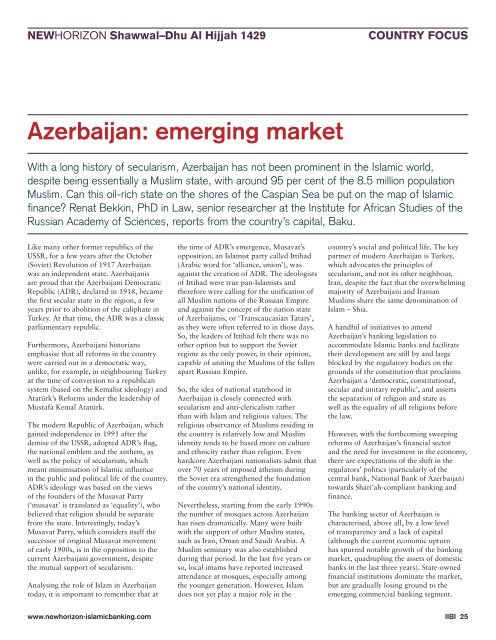azerbaijan: emerging market islamic banking and finance
azerbaijan: emerging market islamic banking and finance
azerbaijan: emerging market islamic banking and finance
Create successful ePaper yourself
Turn your PDF publications into a flip-book with our unique Google optimized e-Paper software.
NEWHORIZON Shawwal–Dhu Al Hijjah 1429<br />
COUNTRY FOCUS<br />
Azerbaijan: <strong>emerging</strong> <strong>market</strong><br />
With a long history of secularism, Azerbaijan has not been prominent in the Islamic world,<br />
despite being essentially a Muslim state, with around 95 per cent of the 8.5 million population<br />
Muslim. Can this oil-rich state on the shores of the Caspian Sea be put on the map of Islamic<br />
<strong>finance</strong>? Renat Bekkin, PhD in Law, senior researcher at the Institute for African Studies of the<br />
Russian Academy of Sciences, reports from the country’s capital, Baku.<br />
Like many other former republics of the<br />
USSR, for a few years after the October<br />
(Soviet) Revolution of 1917 Azerbaijan<br />
was an independent state. Azerbaijanis<br />
are proud that the Azerbaijani Democratic<br />
Republic (ADR), declared in 1918, became<br />
the first secular state in the region, a few<br />
years prior to abolition of the caliphate in<br />
Turkey. At that time, the ADR was a classic<br />
parliamentary republic.<br />
Furthermore, Azerbaijani historians<br />
emphasise that all reforms in the country<br />
were carried out in a democratic way,<br />
unlike, for example, in neighbouring Turkey<br />
at the time of conversion to a republican<br />
system (based on the Kemalist ideology) <strong>and</strong><br />
Atatürk’s Reforms under the leadership of<br />
Mustafa Kemal Atatürk.<br />
The modern Republic of Azerbaijan, which<br />
gained independence in 1991 after the<br />
demise of the USSR, adopted ADR’s flag,<br />
the national emblem <strong>and</strong> the anthem, as<br />
well as the policy of secularism, which<br />
meant minimisation of Islamic influence<br />
in the public <strong>and</strong> political life of the country.<br />
ADR’s ideology was based on the views<br />
of the founders of the Musavat Party<br />
(‘musavat’ is translated as ‘equality’), who<br />
believed that religion should be separate<br />
from the state. Interestingly, today’s<br />
Musavat Party, which considers itself the<br />
successor of original Musavat movement<br />
of early 1900s, is in the opposition to the<br />
current Azerbaijani government, despite<br />
the mutual support of secularism.<br />
Analysing the role of Islam in Azerbaijan<br />
today, it is important to remember that at<br />
the time of ADR’s emergence, Musavat’s<br />
opposition, an Islamist party called Ittihad<br />
(Arabic word for ‘alliance, union’), was<br />
against the creation of ADR. The ideologists<br />
of Ittihad were true pan-Islamists <strong>and</strong><br />
therefore were calling for the unification of<br />
all Muslim nations of the Russian Empire<br />
<strong>and</strong> against the concept of the nation state<br />
of Azerbaijanis, or ‘Transcaucasian Tatars’,<br />
as they were often referred to in those days.<br />
So, the leaders of Ittihad felt there was no<br />
other option but to support the Soviet<br />
regime as the only power, in their opinion,<br />
capable of uniting the Muslims of the fallen<br />
apart Russian Empire.<br />
So, the idea of national statehood in<br />
Azerbaijan is closely connected with<br />
secularism <strong>and</strong> anti-clericalism rather<br />
than with Islam <strong>and</strong> religious values. The<br />
religious observance of Muslims residing in<br />
the country is relatively low <strong>and</strong> Muslim<br />
identity tends to be based more on culture<br />
<strong>and</strong> ethnicity rather than religion. Even<br />
hardcore Azerbaijani nationalists admit that<br />
over 70 years of imposed atheism during<br />
the Soviet era strengthened the foundation<br />
of the country’s national identity.<br />
Nevertheless, starting from the early 1990s<br />
the number of mosques across Azerbaijan<br />
has risen dramatically. Many were built<br />
with the support of other Muslim states,<br />
such as Iran, Oman <strong>and</strong> Saudi Arabia. A<br />
Muslim seminary was also established<br />
during that period. In the last five years or<br />
so, local imams have reported increased<br />
attendance at mosques, especially among<br />
the younger generation. However, Islam<br />
does not yet play a major role in the<br />
country’s social <strong>and</strong> political life. The key<br />
partner of modern Azerbaijan is Turkey,<br />
which advocates the principles of<br />
secularism, <strong>and</strong> not its other neighbour,<br />
Iran, despite the fact that the overwhelming<br />
majority of Azerbaijani <strong>and</strong> Iranian<br />
Muslims share the same denomination of<br />
Islam – Shia.<br />
A h<strong>and</strong>ful of initiatives to amend<br />
Azerbaijan’s <strong>banking</strong> legislation to<br />
accommodate Islamic banks <strong>and</strong> facilitate<br />
their development are still by <strong>and</strong> large<br />
blocked by the regulatory bodies on the<br />
grounds of the constitution that proclaims<br />
Azerbaijan a ‘democratic, constitutional,<br />
secular <strong>and</strong> unitary republic’, <strong>and</strong> asserts<br />
the separation of religion <strong>and</strong> state as<br />
well as the equality of all religions before<br />
the law.<br />
However, with the forthcoming sweeping<br />
reforms of Azerbaijan’s financial sector<br />
<strong>and</strong> the need for investment in the economy,<br />
there are expectations of the shift in the<br />
regulators’ politics (particularly of the<br />
central bank, National Bank of Azerbaijan)<br />
towards Shari’ah-compliant <strong>banking</strong> <strong>and</strong><br />
<strong>finance</strong>.<br />
The <strong>banking</strong> sector of Azerbaijan is<br />
characterised, above all, by a low level<br />
of transparency <strong>and</strong> a lack of capital<br />
(although the current economic upturn<br />
has spurred notable growth of the <strong>banking</strong><br />
<strong>market</strong>, quadrupling the assets of domestic<br />
banks in the last three years). State-owned<br />
financial institutions dominate the <strong>market</strong>,<br />
but are gradually losing ground to the<br />
<strong>emerging</strong> commercial <strong>banking</strong> segment.<br />
www.newhorizon-<strong>islamic</strong><strong>banking</strong>.com IIBI 25
















